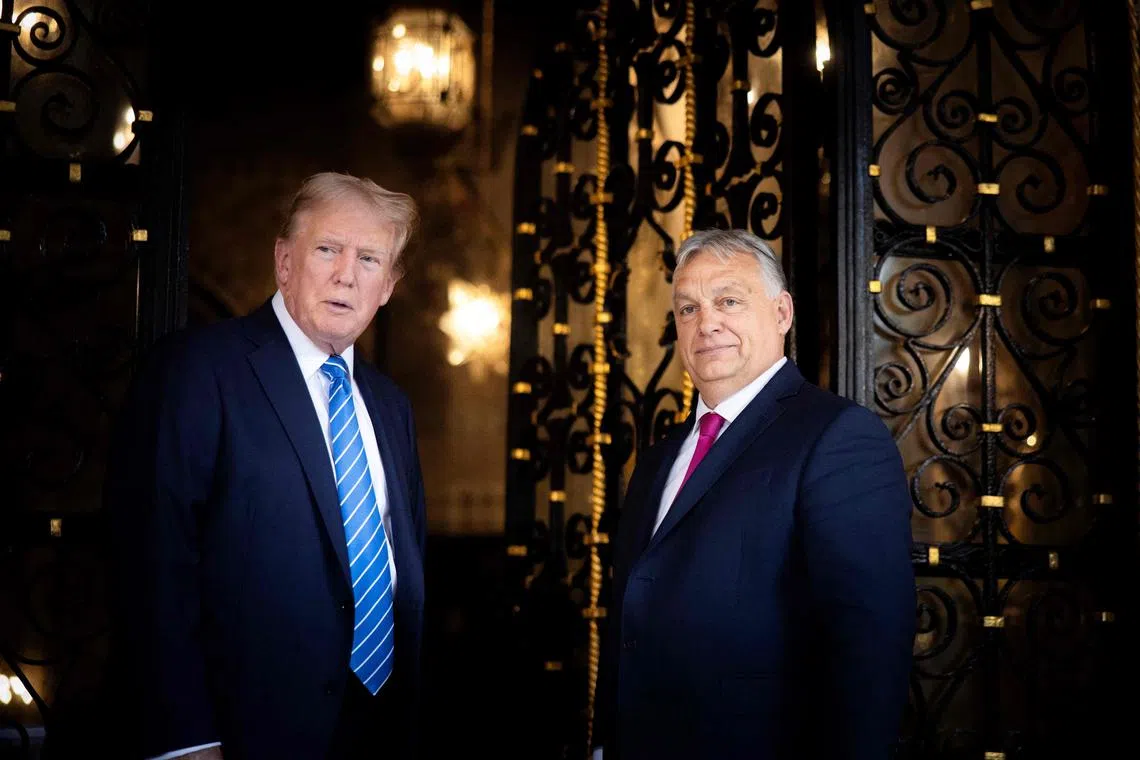News analysis
Trump’s victory emboldens Europe’s far-right parties, for now
Sign up now: Get ST's newsletters delivered to your inbox

Hungary’s Prime Minister Viktor Orban (right) is an old Donald Trump fan currently holding the rotating EU presidency.
PHOTO: AFP
BRUSSELS - Leaders of Europe’s far-right political parties are jubilant at Donald Trump’s electoral victory in the US.
They see Trump’s impending return to the White House
Hungary’s Prime Minister Viktor Orban, an old Trump fan whose country currently holds the rotating EU presidency, hailed the US elections results as a monumental turning point.
“The world is going to change, and change in a quicker way than before,” Mr Orban proclaimed on Nov 9, after hosting a summit of European leaders.
On Nov 13, Mr Jordan Bardella, the EU parliamentary leader of France’s National Rally, arguably Europe’s most significant nationalist mass movement, used the pulpit of the European Parliament to praise Trump’s political agenda, comparing it unfavourably with what he claimed are Europe’s failing priorities.
“Donald Trump’s United States protects itself; Europe lets anything happen. The US frees its markets, and Europe taxes them. The United States innovates, Europe regulates,” Mr Bardella said, to loud applause from his parliamentary soulmates.
Europe’s far-right populists boast a far longer history and much deeper political roots than Trump enjoys in the US.
While it has been less than 10 years since Trump executed a successful corporate takeover of the Republican Party and turned it sharply to the right of the American political spectrum, Europe’s hard-right politicians have spent decades creating new parties and building up their electoral constituencies from scratch.
Electoral progress among Europe’s hard-right fraternity has been slow and painful, often achieved with little cash and in the face of stiff opposition from their national political establishments and Europe’s mass media, which tended to dismiss fringe right-wing politicians as a collection of madcaps.
Yet while Europe’s populist movements have notched up some recent successes in gaining office – apart from Mr Orban, there is also Italian Prime Minister Giorgia Meloni and Slovakia’s Prime Minister Robert Fico – most of the other European right-wing parties remain stuck tantalisingly close to power.
According to the latest opinion polls, the anti-immigrant far-right Alternative for Germany ranks second in the German electorate’s preference. Yet, however well it may do in the German elections scheduled for Feb 23, 2025, it knows that all of Germany’s mainstream parties will sign any alliance agreement to keep it out of power.
France’s National Rally gained 37 per cent of the vote in the country’s general election in July.
Similar situations apply in Austria, the Netherlands, Sweden, and Finland. In all these countries, far-right political movements are either locked out of power or forced to accept coalition arrangements that keep them from enjoying effective control.
Trump’s ability to trounce every American political obstacle and capture the presidency and the two houses of the US Congress is a dream come true for his European admirers.
His larger-than-life personality also resonates with the cult of the strong leader, a feature of all European populist movements.
Furthermore, his ability to flatter his European fans boosts their credibility.
Britain’s Nigel Farage, an anti-immigration nationalist politician whose party has only five MPs in the country’s 650-member Parliament, enjoys far closer personal relations with Trump than Mr Keir Starmer, the British Prime Minister.
And Trump’s recent praise of Mr Orban as “one of the most respected men” delighted him, precisely because he knew that “respected” is not a term most Europeans associate with the Hungarian leader.
Europe’s far-right leaders know very well that what has happened in the US is unlikely to be immediately repeated in Europe, if only because their continent’s political systems are very different from those of the US.
Trump’s winner-takes-all victory, which gives the US President-elect the power to fill his government with whomever he wants and plant his political appointees in most American administrative structures, is unthinkable in Europe.
However, his political narrative remains transferrable to Europe.
The US President-elect has won on a platform promising the mass deportation of illegal immigrants, engineering what could potentially be one of the most significant mass movements of people since World War II.
Europe’s far-right parties were often laughed at for suggesting something similar in their countries. Yet what was dismissed as a silly idea until recently will soon become the official policy of the world’s most powerful nation and Europe’s most significant security provider.
Trump’s love of managed rather than free trade and his other unabashedly nationalist America First policies are also precisely what Europe’s populists have promoted for years.
At every level, therefore, Trump has succeeded in normalising what until recently were concepts dismissed in Europe as just fringe obsessions.
Still, the honeymoon between Trump and his European admirers might not be as enduring as both sides assume.
First, there is the question whether the US President-elect’s signature policies will work as intended. If Trump tries to evict millions of illegal immigrants but fails because of opposition from the American courts or Democrat-controlled states, this will discredit similar ideas in Europe.
If Trump’s trade tariffs and other economic interventions fail to make America great again, that too could deflate the US leader’s European followers.
And then, there are key policy areas where Trump and his European admirers will clash directly.
Trump wants Europe to open its doors to US food exports. How is this going to play out with French farmers being wooed by France’s National Rally movement?
The Trump-led US will also expect Europe’s cooperation in containing China. How does this sit with Hungary’s “respected” Mr Orban, who is prepared to go to any lengths to be friendly to China and whose country is now the lead European destination for Chinese investments?
These are awkward questions that Europe’s far-right politicians prefer to ignore as they continue to toast their American hero.
However, financial markets have already noticed this apparent contradiction between supposed ideological solidarity and different national interests.
So, while Mr Orban continues to hail Trump’s victory, the value of the Hungarian currency continues to nosedive.



